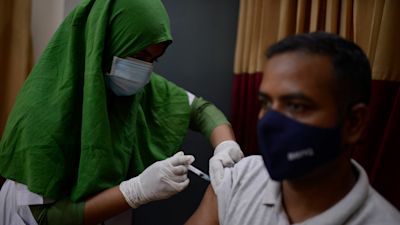Bangladesh urges UK to provide 1.6m AstraZeneca jabs to tackle 'crisis' left by Indian export ban

Words by ITV News Deputy News Editor Mahatir Pasha
The Bangladeshi government is calling for urgent assistance from the UK to help fill a void in the country’s vaccine armoury left by India’s export ban.
Speaking to ITV News, the Minister of Foreign Affairs of Bangladesh AK Abdul Momen described the vaccine situation in Bangladesh as a "crisis", adding: "We are desperate."
A ban on vaccine exports imposed in India, which has been beset by a highly transmissible new Covid variant, has meant that its neighbouring country has only received a third of the AstraZeneca doses it ordered from the Serum Institute.
Of the 30 million doses ordered in February, 5 million doses of which were set to be delivered every month by June, only 10.2 million doses have reached Bangladesh.
This includes 7 million doses which were part of Bangladesh’s procurement plan and 3.2 million which were provided as a gift.
"India is facing a very critical situation, very alarming… They are finding it difficult, we can understand it,” Mr Momen said. "So they are failing to distribute the vaccine they promised to send us."
The interruption to supplies now means that Bangladesh faces the pressing problem of being unable to administer the second dose of the AstraZeneca vaccine to around 1.6 million people within the recommended 12-week window.
Mr Momen told ITV News the Bangladeshi government has appealed directly to the UK government for these required doses, but the request was ultimately rejected on the grounds that the UK government didn't have the capacity.
"We have a belief that if the [UK] government tries, they can do it, because they have the capacity," the Bangladesh Foreign Minister argued.
He added: "My message to UK Government is they should be more sincere. They should help their Commonwealth member states.
"Bangladesh is a good friend of UK… and so many Bangladeshis contribute to the UK… so the UK should come forward.
"I’m not asking for too much, I’m only asking for 1.6m Astra Zeneca doses that they have, they should immediately disperse those to Bangladesh so these people can have their second dose."
Although Covid-19 daily cases in Bangladesh are relatively low and, according to the Foreign Minister, measures were in place to prevent the spread of the Indian variant into Bangladesh, the identification of six cases in Bangladesh earlier this month has concerned some experts.
Senjuti Saha, a Microbiologist at Dhaka’s Child Health Research Foundation who is also conducting genomic sequencing in Bangladesh told ITV News: "We are very worried about the Indian variant, the threat it poses to this country is very real.
"With the relatively low Covid-19 cases in Bangladesh currently, now was the optimal time to increase our vaccination drive, but we find ourselves without stock."
"If vaccination attempts continue to be hindered, we risk paving the way for the Indian variant to flourish in Bangladesh."
The densely populated country is desperately seeking alternative options for its longer-term vaccination plan, including appealing to China, Russia and the USA but is hopeful the UK will be able to provide the solution to its most pressing vaccination problem.
A UK Government spokesperson said: "The UK government does not have a role in the production or distribution of AstraZeneca‘s vaccines or their supply contracts.
"The UK has played a leading role in championing global access to coronavirus vaccines. We are one of the largest donors to COVAX, providing £548 million to deliver more than a billion vaccines to lower-middle income countries this year.
"So far, COVAX has already helped deliver vaccines to more than 120 countries and territories, over 70 of which are lower-income countries.
“Of the almost 1.5 billion vaccines which have been delivered across the world, more than 400 million doses of the Oxford/AstraZeneca vaccine have been given around the world, at cost.
“The Prime Minister has confirmed the UK will share the majority of any future surplus coronavirus vaccines from our supply with the COVAX pool, when these are available.”